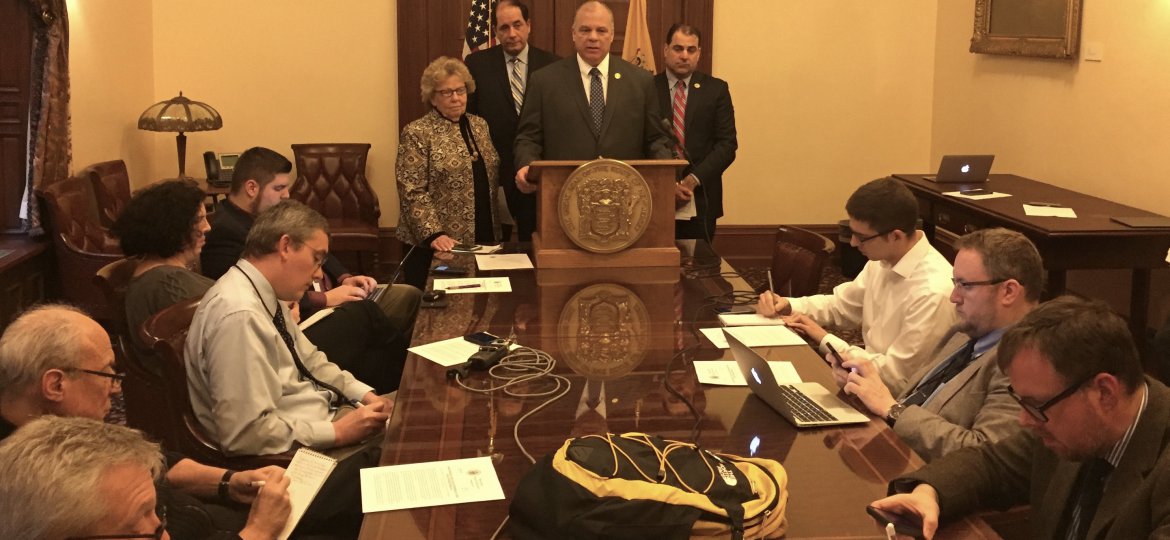
Sweeney, Weinberg, Sarlo & Vitale Call on Christie & House GOP Members To Act In State’s Best Interests
Trenton – Acting to prevent New Jersey from suffering the severe consequences of the repeal of the landmark national health care program, top leaders from the State Senate today called on Governor Christie, the Republican members of the congressional delegation and others to work together to preserve the Affordable Care Act and the accompanying expansion of Medicaid.
Senate President Steve Sweeney, Senate Majority Leader Loretta Weinberg, Senator Paul Sarlo, who chairs the Senate Budget and Appropriations Committee, and Senator Joe Vitale, the chairman of the Senate Health Committee, said a unified, bipartisan effort to prevent the GOP-controlled Congress and President Trump from going forward with the repeal is needed to protect New Jersey’s interests.
“The costs and consequences of the repeal of the Affordable Care Act for New Jersey would be severe,” said Senator Sweeney. “More than 700,000 people who enrolled in the ACA or were added to Medicaid would be at risk of losing the health insurance coverage, the state would lose billions of dollars in federal aid and the state budget would be forced to carry additional expenses.”
A repeal of this landmark law would have a devastating impact on the lives of millions of Americans, including hundreds of thousands of New Jersey residents, and would have severe consequences for the budgets of state governments across the country, especially in the Garden State. The ACA is now providing health coverage to an additional 20 million Americans, including more than 700,000 New Jerseyans who were previously uninsured. The health care law provides Medicaid coverage to individuals who had no realistic means of paying for health insurance.
“The Affordable Care Act includes a number of important provisions that made real progress in the quality and fairness of health care in this country,” said Senator Weinberg. “It prevents discrimination based on gender, protects patients with pre-existing conditions and allows adult children to be covered by their parents’ insurance plans. We cannot lose the progress that has been made and we cannot allow residents to lose health coverage. This may be a political fight for Republicans in Washington, but for so many this is a fight for coverage, for their healthcare and for their lives.”
The Medicaid expansion has been enormously successful in New Jersey. Enrollment in the state’s Medicaid program jumped by half a million people after Gov. Chris Christie permitted its expansion in 2014. The expansion allowed childless adults to be covered, with the federal government paying the full cost. Beneficiaries, whose income cannot exceed $16,394 for an individual a year, pay no premium.
“The fallout for New Jersey from the repeal of the ACA would have serious consequences for the state budget, the state’s economy and for the health and wellbeing of countless New Jerseyans,” said Senator Sarlo. “Hundreds of thousands of people could lose coverage, the state would lose up to $3 billion in federal aid, we’d have to spend $1 billion more from the budget, the trust fund for uncompensated care could be hurt and jobs will be lost.”
The rollback of the Medicaid expansion could cause New Jersey to lose $3 billion in federal aid. The state could be forced to spend $1 billion annually in higher Medicaid expenses. And, because the ACA significantly reduced the number of uninsured New Jerseyans, the state’s savings of $350 million in Charity Care expenses could be erased. Under Charity Care, New Jersey sends funds to hospitals to pay for uncompensated care that they provide to disadvantaged New Jerseyans.
A report released late last year by New Jersey Policy Perspective warned that dismantling the ACA could also endanger the jobs of some 86,000 healthcare and other workers hired in New Jersey since it took effect in 2014.
The efforts to fight the epidemic of opioid abuse and addiction could also be imperiled.
“The governor just last week signed an executive order declaring opioid drug abuse a public health crisis, and marshaled the state’s resources to fight the impact of drug addiction,” said Senator Vitale. “Any elimination of the Medicaid expansion under the Affordable Care Act would be devastating to our state’s most vulnerable residents, and to countless individuals who rely on Medicaid to get the help they need as they battle with addiction.”
A full repeal of the ACA would also do away with the subsidies that many use to purchase discounted plans on the health care marketplace. Without those subsidies, many New Jerseyans who do not obtain coverage through an employer would opt not to purchase insurance at all. Only the sickest individuals who need coverage most would purchase insurance. This will leave insurance companies with an unsustainable customer base. They would have no choice but to increase premiums significantly for all plans, which could have a crippling effect on the budgets of individuals, families and businesses. As a result, we could see many New Jersey businesses move to high-deductible plans, significantly increase premium sharing, or end employee health coverage altogether.
The legislators said that improvements could be made to the ACA to make it better but that the so-called “repeal and replace” strategy was foolishly counterproductive, especially because no replacement plan has been offered.

